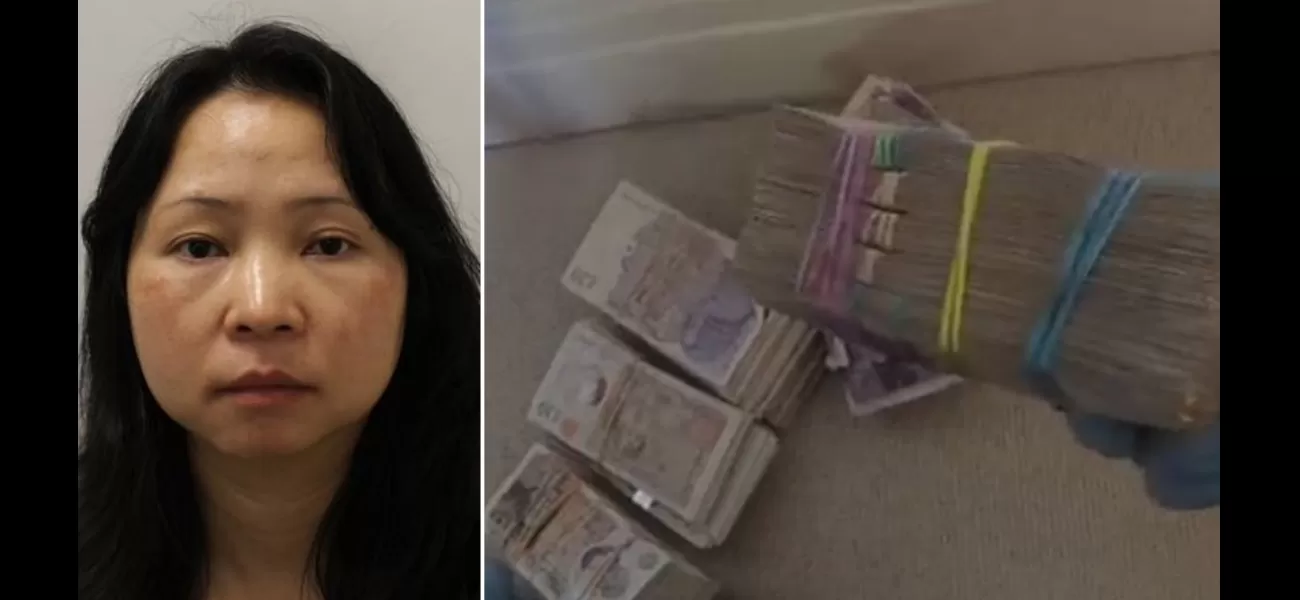A former takeaway employee has been imprisoned for involvement in a £5 billion Bitcoin scheme.
Authorities became doubtful when she attempted to purchase a Hampstead estate for £23 million.
May 26th 2024.

Jian Wen, a former Chinese takeaway worker, received a sentence of six years in prison for her involvement in a major Bitcoin ring that was found guilty of money laundering. The police had discovered over £5 billion worth of Bitcoin, which raised suspicions about Wen's attempts to purchase expensive properties in London, including a £23 million mansion in Hampstead.
It was revealed that Wen was just a front for a larger wealth management scam that had defrauded more than 128,000 investors. She had moved to the UK in 2007 and lived a modest life in Leeds until 2017, when she relocated to London and started working at a Chinese takeaway in Abbey Wood.
Wen's life took a sudden turn when she came across an advertisement on the Chinese social media app WeChat. The ad was looking for a "butler" for a woman who claimed to run a business trading in diamonds and antiques around the world. Wen applied and soon moved into a luxurious six-bedroom house in Hampstead Heath, paying a staggering £17,000 a month in rent. She even drove a Mercedes and brought her son over from China to attend an exclusive private school.
However, things took a dark turn when the police raided the Hampstead property, known as the Manor House, and seized a safety deposit box containing digital wallets holding over £1.4 billion worth of Bitcoin. Wen denied any wrongdoing but was convicted by a jury at Southwark Crown Court of entering into a money laundering arrangement between October 2017 and January 2022. The charge was related to the laundering of 150 Bitcoin worth approximately £7.5 million. Wen claimed she had no knowledge that the Bitcoin came from fraudulent activities and insisted that she had been tricked by one of the fraudsters.
During the trial, it was revealed that Wen had been living a lavish lifestyle, driving a £25,000 E-Class Mercedes and spending £30,000 a month at Harrods. The judge, Sally-Ann Hales, KC, stated that it was evident that Wen had come to enjoy the finer things in life and had been generously rewarded for her services. She rejected the defense's argument that Wen's involvement in the crime was due to exploitation and stated that it was a sophisticated offense that involved significant planning. The judge also acknowledged the 128,000 investors who had been defrauded and the economic hardship and loss they must have suffered.
Wen, who had been in custody since March 2022, was sentenced to six years and eight months in prison. The prosecutor, Gillian Jones KC, informed the jury that Wen did not dispute that she had dealt with the Bitcoin. He asked the jury to consider whether Wen knew or suspected that she was dealing with the proceeds of crime and chose to ignore the concerns and warnings given about the source of the funds. He also pointed out that Wen had declared very little income in the years 2017-2019 but had spent large amounts on luxury items.
It was revealed that Wen had traveled across Europe to sell Bitcoin and bought expensive jewelry, including a watch worth up to £70,000 from Van Cleef and Arpels in Switzerland. She had also spent £90,000 at Harrods on designer clothes, jewelry, and shoes in just three months. Wen had bought two apartments in Dubai for more than £500,000 and attempted to purchase an 18th-century Tuscan villa with a sea view for £10 million. She also tried to acquire high-value properties in London, including a seven-bedroom mansion in Hampstead for £23.5 million and an eight-bedroom home with a cinema and gym for £12.5 million. However, these sales did not go through as the source of her wealth could not be verified.
Wen's life of luxury came to an end in the summer of 2021 when she was arrested after the police raided her home. Her defense lawyer, Mark Harris KC, argued that she was acting under orders from others and did not play a leading role in the crime. He stated that it would be unfair to punish her for someone else's criminal activities that she was not involved in or aware of. Harris also suggested that there might be others who were more involved in the offense and should face harsher punishment.
The jury was unable to reach verdicts on two additional money laundering charges, and these were ordered to be kept on file. The Chief Crown Prosecutor, Andrew Penhale, acknowledged that Bitcoin and other cryptocurrencies are being used by organized criminals to disguise and transfer their assets. He stated that this case, which involved the largest cryptocurrency seizure in the UK, highlights the scale of criminal proceeds available to these fraudsters. The CPS is committed to working closely with law enforcement and investigative authorities to bring these individuals and companies to justice.
It was revealed that Wen was just a front for a larger wealth management scam that had defrauded more than 128,000 investors. She had moved to the UK in 2007 and lived a modest life in Leeds until 2017, when she relocated to London and started working at a Chinese takeaway in Abbey Wood.
Wen's life took a sudden turn when she came across an advertisement on the Chinese social media app WeChat. The ad was looking for a "butler" for a woman who claimed to run a business trading in diamonds and antiques around the world. Wen applied and soon moved into a luxurious six-bedroom house in Hampstead Heath, paying a staggering £17,000 a month in rent. She even drove a Mercedes and brought her son over from China to attend an exclusive private school.
However, things took a dark turn when the police raided the Hampstead property, known as the Manor House, and seized a safety deposit box containing digital wallets holding over £1.4 billion worth of Bitcoin. Wen denied any wrongdoing but was convicted by a jury at Southwark Crown Court of entering into a money laundering arrangement between October 2017 and January 2022. The charge was related to the laundering of 150 Bitcoin worth approximately £7.5 million. Wen claimed she had no knowledge that the Bitcoin came from fraudulent activities and insisted that she had been tricked by one of the fraudsters.
During the trial, it was revealed that Wen had been living a lavish lifestyle, driving a £25,000 E-Class Mercedes and spending £30,000 a month at Harrods. The judge, Sally-Ann Hales, KC, stated that it was evident that Wen had come to enjoy the finer things in life and had been generously rewarded for her services. She rejected the defense's argument that Wen's involvement in the crime was due to exploitation and stated that it was a sophisticated offense that involved significant planning. The judge also acknowledged the 128,000 investors who had been defrauded and the economic hardship and loss they must have suffered.
Wen, who had been in custody since March 2022, was sentenced to six years and eight months in prison. The prosecutor, Gillian Jones KC, informed the jury that Wen did not dispute that she had dealt with the Bitcoin. He asked the jury to consider whether Wen knew or suspected that she was dealing with the proceeds of crime and chose to ignore the concerns and warnings given about the source of the funds. He also pointed out that Wen had declared very little income in the years 2017-2019 but had spent large amounts on luxury items.
It was revealed that Wen had traveled across Europe to sell Bitcoin and bought expensive jewelry, including a watch worth up to £70,000 from Van Cleef and Arpels in Switzerland. She had also spent £90,000 at Harrods on designer clothes, jewelry, and shoes in just three months. Wen had bought two apartments in Dubai for more than £500,000 and attempted to purchase an 18th-century Tuscan villa with a sea view for £10 million. She also tried to acquire high-value properties in London, including a seven-bedroom mansion in Hampstead for £23.5 million and an eight-bedroom home with a cinema and gym for £12.5 million. However, these sales did not go through as the source of her wealth could not be verified.
Wen's life of luxury came to an end in the summer of 2021 when she was arrested after the police raided her home. Her defense lawyer, Mark Harris KC, argued that she was acting under orders from others and did not play a leading role in the crime. He stated that it would be unfair to punish her for someone else's criminal activities that she was not involved in or aware of. Harris also suggested that there might be others who were more involved in the offense and should face harsher punishment.
The jury was unable to reach verdicts on two additional money laundering charges, and these were ordered to be kept on file. The Chief Crown Prosecutor, Andrew Penhale, acknowledged that Bitcoin and other cryptocurrencies are being used by organized criminals to disguise and transfer their assets. He stated that this case, which involved the largest cryptocurrency seizure in the UK, highlights the scale of criminal proceeds available to these fraudsters. The CPS is committed to working closely with law enforcement and investigative authorities to bring these individuals and companies to justice.
[This article has been trending online recently and has been generated with AI. Your feed is customized.]
[Generative AI is experimental.]
0
0
Submit Comment





